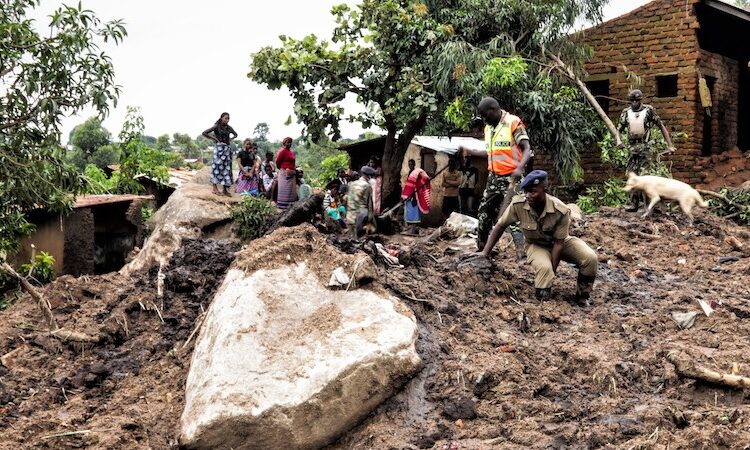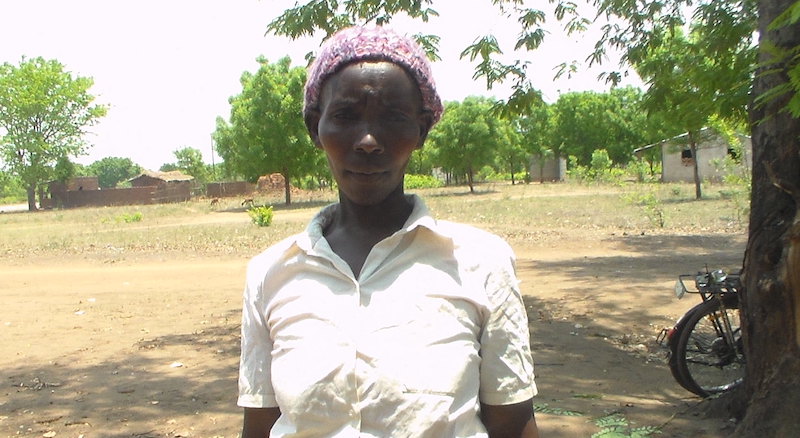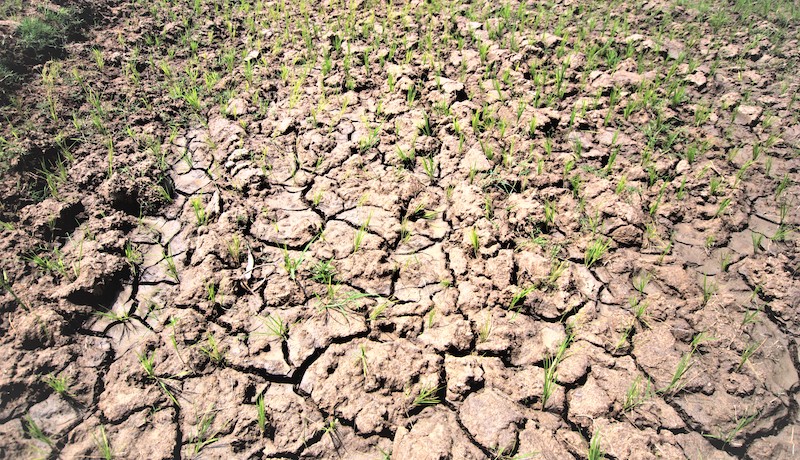
After the UK cut short a £52m climate adaptation scheme in Malawi, vulnerable communities saw their livelihoods destroyed by Cyclone Freddy
After cyclone Freddy ravaged Malawi at the start of the year, mother-of-nine Elube Sandram was left staring at a trail of devastation.
Flood water had destroyed all her corn crops, an essential lifeline to feed her family and earn a modest income. The spiralling costs of seeds and fertilisers put replanting beyond her reach.
“The cyclone left me completely with nothing”, she told Climate Home News.
As Sandram searched for help, she said no relief was available aside from the limited support she could obtain from family members.

Elube Sandram was among the beneficiaries of the UK-funded programme in Malawi’s Chikwawa district. Photo: Raphael Mweninguwe
Her problems could have been prevented. In 2018, she registered for a £52 million ($63m) UK aid programme which helped vulnerable Malawians better cope with climate-driven floods and droughts.
But during the Covid-19 pandemic in 2020, the UK government cut back its aid spending, ending support for Sandram and many others in Malawi and around the world.
Let down
The programme that Sandram was involved with was run by UN agencies and NGOs and helped farmers by providing them with tools, training on things like pig farming and financial assistance like weather-related insurance or cash transfers.
The idea was that it’s not quite so disastrous if a flood or a drought destroys a farmers’ crops if they have livestock or an insurance payout to keep putting food on the table.
But following the UK’s cutbacks, several parts of the scheme have been reduced or axed altogether.
The activities run by a group of NGOs were wound down in 2021, two and a half years before their scheduled end. Concern Worldwide and Goal Malawi, the main implementing partners, closed their local offices. Only a series of projects with a more limited scope operated by UN agencies are still running.
Aubrey Kabudula, a farmer from Kwataine Village in Chikwawa, told Climate Home: “We were told that one of the objectives is to help people to be climate-resilient.”
“With its abrupt closure we do not think that has been achieved,” he said.
World Bank to initially host loss and damage fund under draft deal
It is an assessment shared by the Independent Commission for Aid Impact (ICAI), the UK body tasked with scrutinising how foreign aid is spent.
In June, they said that the project had been “highly effective and coherent” but had been “undermined” by cutbacks to aid and the downsizing or removal of components.
Issues are only likely to get worse. Malawi is increasingly struggling with more frequent and intense cycles of flooding and droughts. The passage of Cyclone Freddy in March killed more than 600 people and displaced at least 650,000 more, while also dismantling infrastructures and livelihoods.
Climate shocks have exacerbated poverty levels, especially for rural farmers. The World Bank estimates that over half of the country’s 19.1 million people live in poverty with women being the most affected. Low agriculture production because of droughts and floods is cited as one of the main causes.
Rishi Sunak’s rollbacks
Countries like Malawi cannot afford to address these problems alone.
Unsustainable levels of existing public debt rule out borrowing at expensive rates as an option. Most of Malawi’s climate plans are funded through grant-based international public finance provided by rich countries like the United Kingdom.
At the United National General Assembly in 2019 the then-prime minister Boris Johnson made a big, and unexpected, announcement.
He promised the UK would double its international climate finance to reach a target of £11.6 billion ($14.2bn) in 2026.
Only a few months later the global Covid-19 pandemic upended daily lives and economic orders, prompting an abrupt rethink of spending priorities.
International aid was one of the casualties. Then finance minister Rishi Sunak cut its foreign aid target from 0.7% of gross national income to 0.5%.
With Sunak now prime minister, this “temporary measure” has yet to be reversed.
Since then, the competition for a shrinking pool of money has intensified as aid funding has been diverted to support Afghan and Ukrainian refugees hosted in the UK.
Australia to accept migrants from climate-hit Tuvalu in security pact
An internal government document reported on by the Guardian suggested the £11.6bn goal could be dropped as general aid cut-backs make it a “huge challenge”.
Not just Malawi
The cuts have hit climate projects around the world. UK-funded climate resilience projects have been cut or delayed in India, Pakistan, Nepal, Kenya and small-island states.
Government figures show that the number of people whose climate resilience was improved by UK aid flatlined for the first time since records began in the last financial year.
In India, a foreign office report found that budget cuts meant that activities to help rural communities cope with climate impacts had been “reduced, slowed down and stopped in some instances”.
In Pakistan, a foreign office report found that a £38 million ($46m) climate resilience plan had been paused for 18 months because of “uncertainty… following significant and unanticipated costs incurred to support the people of Ukraine and Afghanistan in finding refuge in the UK.
A large-scale project aiming to help a series of African countries build resilience to climate change suffered a significant “scale back from its original ambition”, as its annual summary said.
The programme envisaged a £250 million ($306m) budget in its business case, but this has now been reduced to “up to £100 million” ($122m).
Targets have been scaled back too. One original target was to improve the resilience of four million people through an early-warning system. That’s been reduced to three million.
In Chikwawa the climate project has still left a mark in the minds of many people despite the cutbacks.
The beneficiaries now hope that the country, a former British colony, will not be entirely forgotten.
“I am still optimistic that the assistance that we were receiving from the donor [UK government], will not be gone forever,” said Sandram. “And if I were to be asked whether that funding should resume or not, I will say it should resume because climate change is here to stay.”







